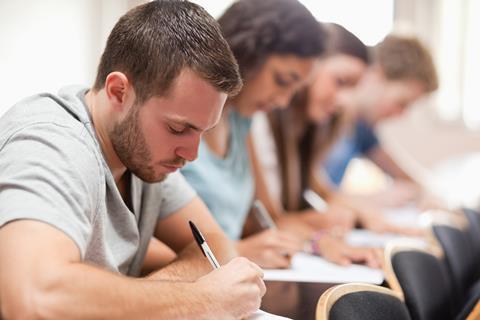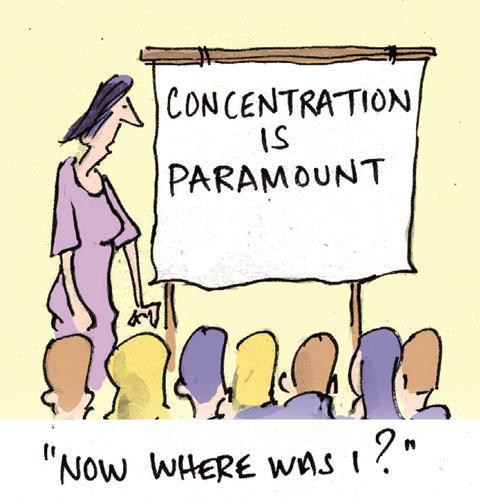Francesca Burgoyne from the RSC helps you prepare for the year with tips to boost your memory and make the most of your learning

The new year means a chance to start afresh and resolve to do better in the coming year. I’m sure many of you will have made resolutions to get fit, take up a hobby, volunteer for a charity (mine will be to eat less cake…). As we’re interested in chemistry – and any good chemical process should be efficient – how about resolving to learn more efficiently by getting the best out of your memory? After all, learning is essentially a result of chemical processes in your brain forming memories and making connections between them.
Information overload
Last term you will have been introduced to lots of unfamiliar concepts, and probably feel a bit overwhelmed with new information. But don’t worry, once you’ve got the hang of the basics the trickier stuff gets easier. This is because space available to process new information in your short-term memory depends on whether you already know a bit about the subject and how complicated it is. So once you have the basics, more of your short-term memory is freed up to unravel complicated ideas, as you just have to remember the basic facts and not learn them.
You can think of this a bit like using cookies from a website – when you visit a website for the first time that website knows nothing about you but it can collect small packets of data during your visit, eg your name or email address. The next time you visit that website your information is retrieved and the website works smoother and faster for you.
Log out, switch on

Your brain is remarkable but it can only hold a certain amount of information in short-term memory. So what happens when we get distracted? To go back to the computer analogy, think about RAM (computer short term memory which keeps track of all the current processing). Your computer can only run so many processes at a time. If it is turned off unexpectedly, any data in this temporary storage system is lost. You need to save your work to make sure it is stored safely.
Your memory works in a similar way – if you are distracted (a bit like switching off suddenly), it is easy to forget what you were thinking about, and you need to start that process again. So it’s a good idea to log out of Facebook, Twitter and Skype to prevent any distractions when you’re trying to learn something new – or that eureka moment could disappear faster than a tag on an unflattering photo.
Let’s connect
So how do you move information from short-term memory when you first learn it to long-term memory so that you can recall it for your exams? Repeating something over and over will eventually lodge it in your brain, but you can take a shortcut by making connections between memories. You will find it easier to remember a new idea if it is linked to something you know really well. Try making up rhymes, acronyms or drawing pictures. I’ve never forgotten OIL RIG – Oxidation Is Loss, Reduction Is Gain. Two words, one fundamental chemical principle I’m never going to forget.
Preparation is everything
It may be stating the obvious, but you can do a lot to help yourself, if you are organised:
- Know the basics. Ask your teacher to clarify any ideas that you are not comfortable with, before you tackle tougher theories.
- Do your homework (no, really). It’s there to reinforce what you learnt in a lesson, not torture you. The more familiar you are with a concept the easier you will find it to build on next time.
- Do set reading before a lesson. Face time with teachers is incredibly valuable because you can ask questions (I only discovered this at university, where contact time is precious!). If you’ve done the reading you can focus on the bits that you don’t get, rather than having to be taught everything from scratch.
Learning is a personal thing
Everyone is different, which is great – but it means that we all have different ways to learn things too. One of our Dr ChemNets gives his words of chemical wisdom:
’I decided to have a pocket book with me at all times so that I could jot down the ‘how to do it’ information that wasn’t being given in the official notes from my teachers. This, of course, is not exactly cutting-edge. What really made the difference was, each day, to look at all the jottings I had made and to write them into the ‘official’ notes. This had a number of benefits: I had to look at the official notes again and the result was my own work rather than my teacher’s. More than this was the minor glow of satisfaction that I had not let anything pass me by as I drew a line through the jottings in my pocket book.
Learning is encouraged by repetition and by personal reward. This study method provided both.’
Experiment!
Learning how to study is a very personal thing. You don’t know what works for you until you have tried and, perhaps, failed to make a technique effective.
Your notebook is probably electronic but the principle is the same. You’re a budding chemist – don’t be afraid to experiment with learning methods!
Resources
The friendly folk at the RSC want you to love chemistry as much as we do, so there are lots of resources to help you with your studies.
- Events – find out what being a chemist is really like with lectures, lab tours and hands-on sessions.
- Careers advice – the next steps can be daunting but we have lots of information on the different options available and how to get there.
- Resources – explore our full range of resources for teachers of chemistry.
- Visual Elements Periodic Table – an interactive display of facts, atomic data, videos and podcasts. All you could ever want to know about the elements.
- Spectraschool – for budding analytical chemists.
- Gridlocks – dozens of puzzles to test your chemistry.
Originally published in The Mole









No comments yet